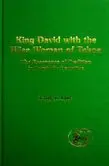

King David With the Wise Woman of Tekoa: The Resonance of Tradition in Parabolic Narrative
in Library of Hebrew Bible/Old Testament Studies
Pages
217
Publisher
Zondervan
Published
1/1/1997
ISBN-13
9781850758266
Reviews
King David with the Wise Woman of Tekoa: The Resonance of Tradition in Parabolic Narrative JSOTSup 255 Sheffield: Sheffield Academic Press, 1997. Pp. 211, Hardcover, $66.00/£40.00, ISBN 1850758263. Sara Mandell The University of South Florida Tampa, FL 33620-5550 This compact, well-composed, and well-presented work is an "intertextual" study of the parable found in 2 Sam 14:1-20. It contains acknowledgments, a list of abbreviations, an introduction, three chapters, a conclusion, a bibliography, and indices of references and authors. Lyke's thesis is that "The Wise Woman of Tekoa" mashal in 2 Sam 14:1-20 is not unique but paradigmatic. Using intertextual analysis, which demands that the work in its "final form" be treated as a literary entity, he compares this mashal with other meshalim and/or parallel themes and topoi in the Hebrew Scriptures. No matter what meshalim he draws on or whence, Lyke's concern is always with David's sons and their sibling rivalry as it relates to David himself. Lyke's method predicates his belief that the parallels he has found issued from the same source or had been influenced by one another. This makes it possible to distinguish between the intertextuality that emanates from "simple common origins in the literary conventions of ancient Israel," and that in which the traditions show something more than what can be presupposed on that basis (pp. 18-19). The "complex accumulation of overlapping biblical topoi," each of which must be interpreted within various contexts (p. 12), indicates that the mashal with its embedded narrative emanates from a community rather than an author. In the "Introduction," Lyke accepts the existence of an ambiguity resultant from "the multiple voices that comprise the mashal" (p. 20). The real correspondence between "The Wise Woman of Tekoa" mashal and the Davidic biography and Court Narrative lies in David's understanding of its relevance to himself and Absalom. Because polyvalence gives the mashal meaning for the personae of the narrative as well as for the reader, the narrator generally expects his audience and David to be equally competent in its decipherment (p. 19).
[Full Review]
